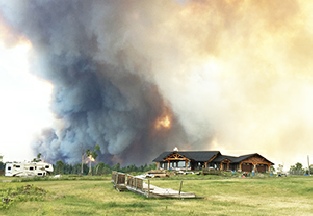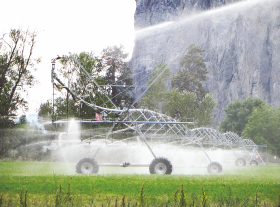VICTORIA – BC Assessment Authority staff continue to comb through data and identify properties damaged by this summer’s wildfires in advance of issuing assessment notices at the end of December.
“We’re continuing to identify new properties as we speak,” Duane Bates, acting vice- president of assessment with the authority told Country Life in BC last month.
Northern BC, the assessment region that includes the hard- hit Cariboo, counted 246,000 properties assessed at more than $60 billion last year.
The new assessment roll could see that value dip, as assessors take into account the loss to an untold number of properties.
Working with data from local governments as well as local emergency services, news articles and homeowner reports, assessors have been able to identify most of the properties affected by the wildfires. However, 140 properties were sent notices because the available data was inconclusive.
“We only sent letters where we had anticipation that we might have property damage and we weren’t able to verify that through any other source such as local government, regional districts [and] emergency services,” Bates explained. “Other properties, we’re still working with emergency services and local government.”
Affected property owners were contacted and asked to self- report, much as property owners around the province are asked to do from time to time as part of BC Assessment’s intermittent reviews of roll information.
“No matter what we do, the best information is always the property owner’s,” Bates said. “The property owner always knows what the property is like and what condition it’s in and what impact it’s had.”
November was a critical month for assessors. While the assessed value of properties for the 2018 roll is the value they’re deemed to have had at July 1, 2017, the value is assigned to the condition of the properties on October 31. The wildfires that struck between those two dates mean the calculation isn’t straight- forward this year.
“So if there was no buildings left on the property because of damage by October, we’re going to value that property as a vacant property and we’ll look at what the value would have been for a vacant property in July,” Bates explained.
Bates encourages property owners to stay in touch with the authority to ensure the assessment roll remains accurate. Should the assessments issued in January look out of whack with conditions on the ground, BC Assessment is open to making changes.
“Give us a call right away. We can make changes without putting them through the process of an appeal,” he said. “We’ll work with you – our goal is to get that assessment accurate.”
Moreover, if property owners want to know the impact reconstruction will have on future assessments, authority staff can provide guidance.
Unlike other jurisdictions hit hard by wildfires this year, such as states in the US, a single assessor values properties in BC. This increases the chances that property owners will receive equitable treatment across the province.
California landowners, by contrast, are assessed at the county level, increasing the chance of variations in how properties are treated following disasters such as wildfires.


 Entertaining tidbits
Entertaining tidbits